Unit 9 Can you come to my party?Section A (Grammar Focus-3c)课件(共28张PPT) 2024-2025学年人教版英语八年级上册
文档属性
| 名称 | Unit 9 Can you come to my party?Section A (Grammar Focus-3c)课件(共28张PPT) 2024-2025学年人教版英语八年级上册 | 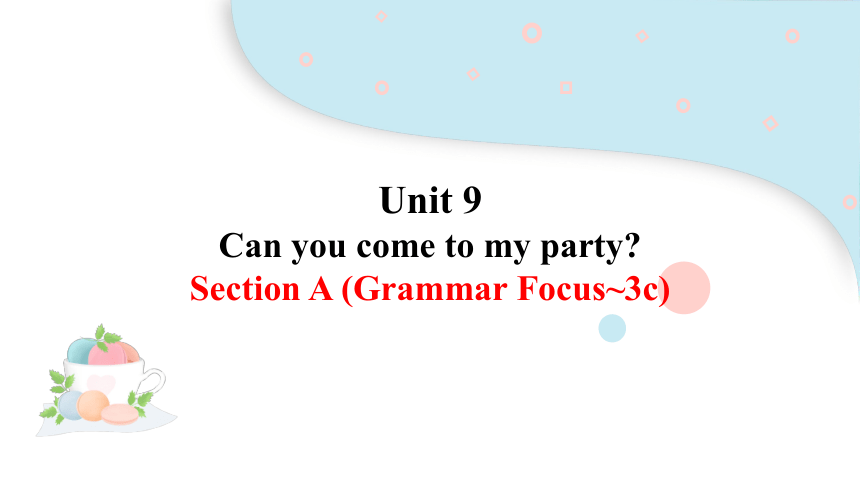 | |
| 格式 | pptx | ||
| 文件大小 | 812.6KB | ||
| 资源类型 | 教案 | ||
| 版本资源 | 人教新目标(Go for it)版 | ||
| 科目 | 英语 | ||
| 更新时间 | 2024-07-20 10:38:29 | ||
图片预览

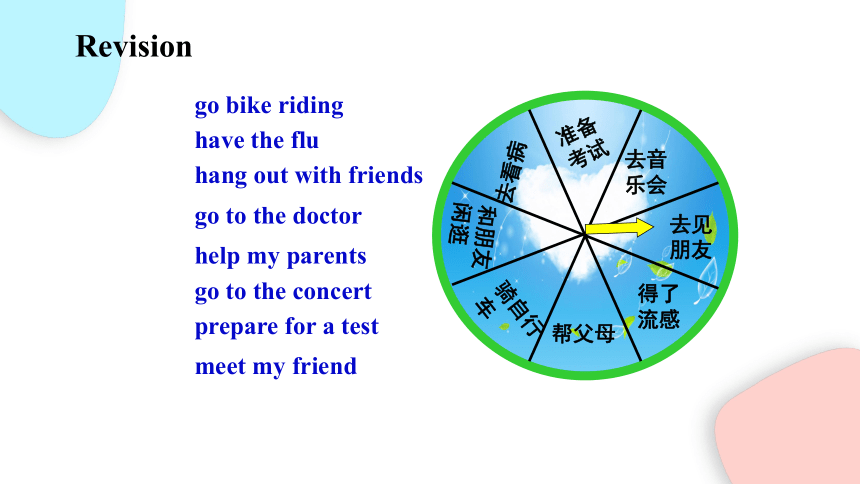
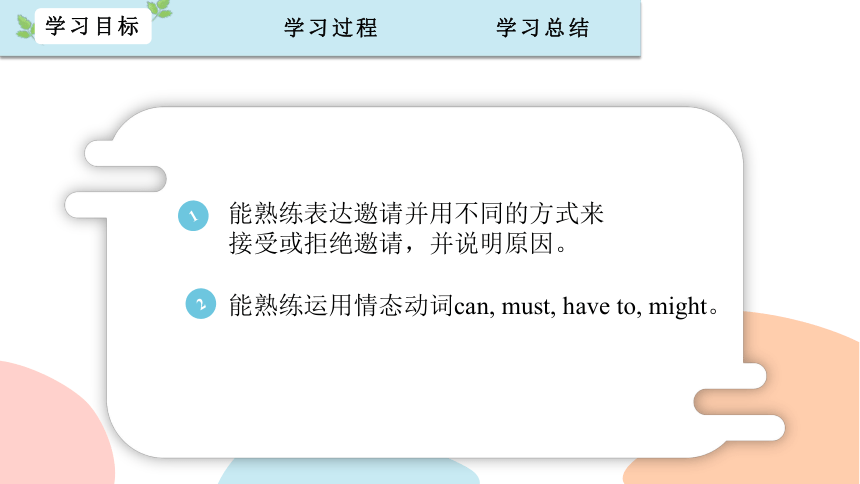
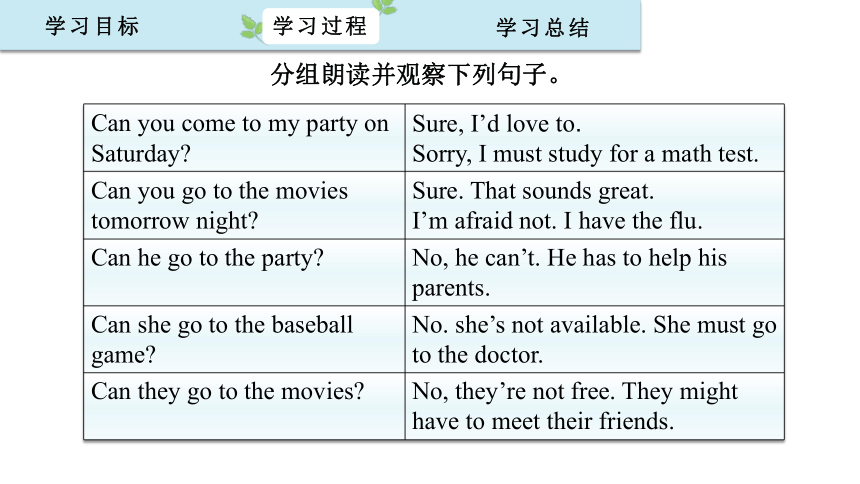
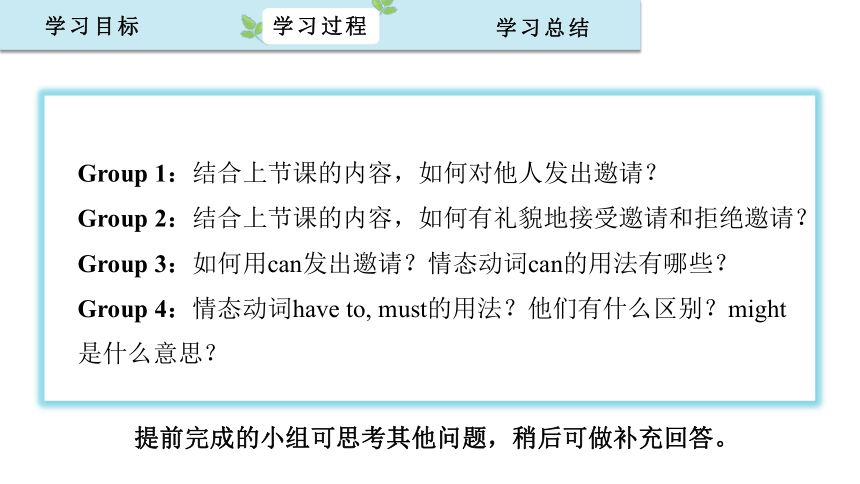
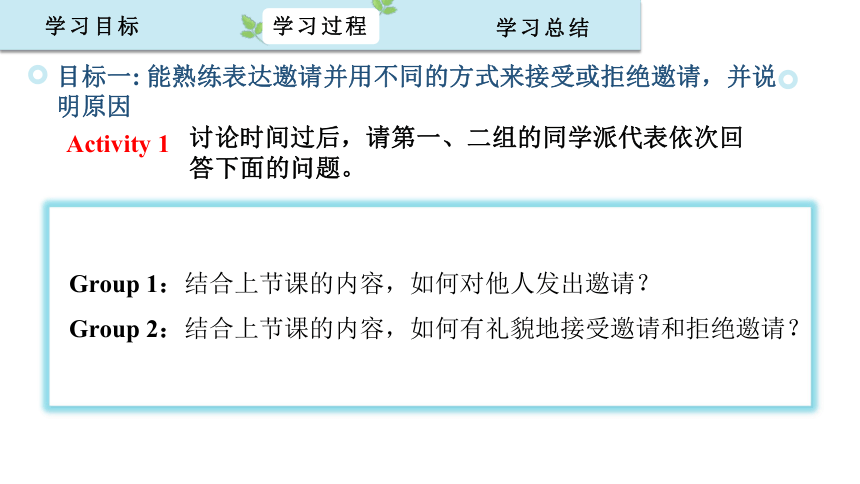
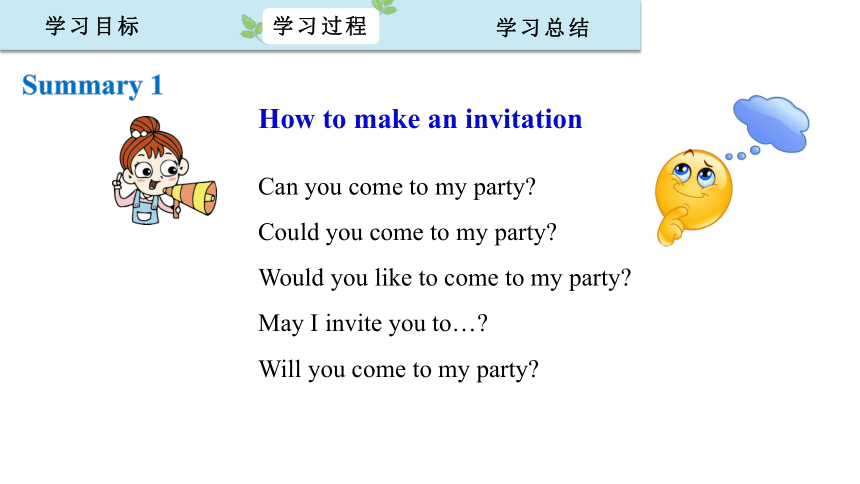
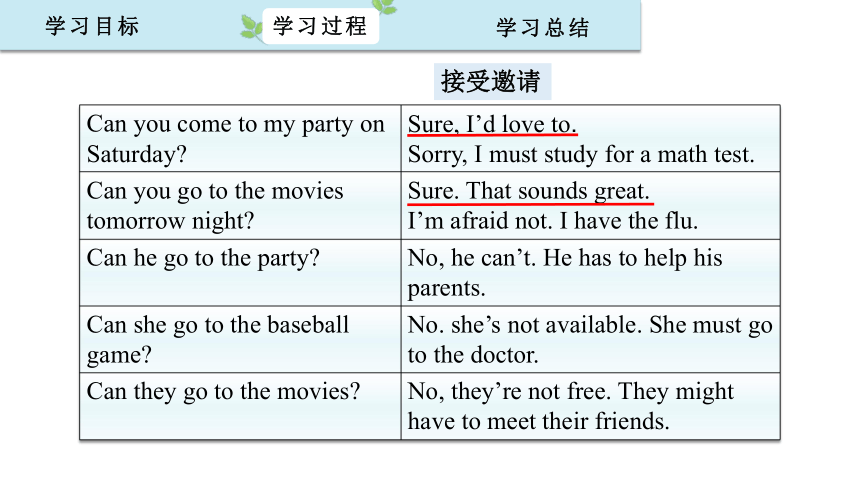
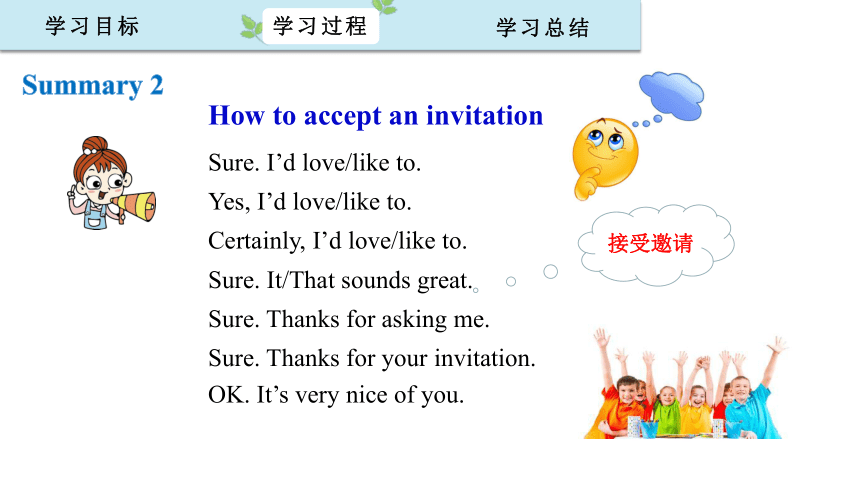
文档简介
(共28张PPT)
Unit 9
Can you come to my party
Section A (Grammar Focus~3c)
Revision
和朋友闲逛
准备考试
去看病
去音乐会
骑自行车
帮父母
去见朋友
得了流感
go bike riding
have the flu
hang out with friends
go to the doctor
help my parents
go to the concert
prepare for a test
meet my friend
能熟练运用情态动词can, must, have to, might。
1
能熟练表达邀请并用不同的方式来接受或拒绝邀请,并说明原因。
2
分组朗读并观察下列句子。
Can you come to my party on Saturday Sure, I’d love to.
Sorry, I must study for a math test.
Can you go to the movies tomorrow night Sure. That sounds great.
I’m afraid not. I have the flu.
Can he go to the party No, he can’t. He has to help his parents.
Can she go to the baseball game No. she’s not available. She must go to the doctor.
Can they go to the movies No, they’re not free. They might have to meet their friends.
Divide the whole class into 4 groups and
each group discusses one question.
1 组
2 组
3 组
4 组
Group 1:结合上节课的内容,如何对他人发出邀请?
Group 2:结合上节课的内容,如何有礼貌地接受邀请和拒绝邀请?
Group 3:如何用can发出邀请?情态动词can的用法有哪些?
Group 4:情态动词have to, must的用法?他们有什么区别?might是什么意思?
提前完成的小组可思考其他问题,稍后可做补充回答。
目标一: 能熟练表达邀请并用不同的方式来接受或拒绝邀请,并说明原因
讨论时间过后,请第一、二组的同学派代表依次回答下面的问题。
Activity 1
Group 1:结合上节课的内容,如何对他人发出邀请?
Group 2:结合上节课的内容,如何有礼貌地接受邀请和拒绝邀请?
Summary 1
How to make an invitation
Can you come to my party
Could you come to my party
Would you like to come to my party
May I invite you to…
Will you come to my party
Can you come to my party on Saturday Sure, I’d love to.
Sorry, I must study for a math test.
Can you go to the movies tomorrow night Sure. That sounds great.
I’m afraid not. I have the flu.
Can he go to the party No, he can’t. He has to help his parents.
Can she go to the baseball game No. she’s not available. She must go to the doctor.
Can they go to the movies No, they’re not free. They might have to meet their friends.
接受邀请
Summary 2
How to accept an invitation
Sure. I’d love/like to.
Yes, I’d love/like to.
Certainly, I’d love/like to.
Sure. It/That sounds great.
Sure. Thanks for asking me.
Sure. Thanks for your invitation.
OK. It’s very nice of you.
接受邀请
Can you come to my party on Saturday Sure, I’d love to.
Sorry, I must study for a math test.
Can you go to the movies tomorrow night Sure. That sounds great.
I’m afraid not. I have the flu.
Can he go to the party No, he can’t. He has to help his parents.
Can she go to the baseball game No. she’s not available. She must go to the doctor.
Can they go to the movies No, they’re not free. They might have to meet their friends.
拒绝邀请 说明理由
How to refuse an invitation
Sorry, I can’t. I have to…
I’m sorry I can’t. I must…
I’d love to, but I have to…
I’m afraid not. I might have to …
Sorry. I’m not free. I am going to…
I’m sorry. I’m not available. I …
拒绝邀请
目标二: 能熟练运用情态动词can, must, have to, might
讨论时间过后,请第三、四组的同学派代表依次回答下面的问题。
Activity 1
Group 3:如何用can发出邀请?情态动词can的用法有哪些?
Group 4:情态动词have to, must的用法?他们有什么区别?might是什么意思?
用can打听第三方是否能参加聚会,表示一种可能性。
用can发出邀请
Summary 3
Can you come to my party on Saturday
Can you go to the movies tomorrow night
Can he go to the party
Can she go to the baseball game
Can they go to the movies
情态动词can的用法
can是一个常见的情态动词,表示说话人的语气或情态,基本意思是“能; 会”。它没有人称和数的变化,在句子中不能单独作谓语,其后必须跟实义动词原形。can的否定形式为can not/can’t/can not;过去式为could,其过去否定形式为could not/couldn't。
情态动词can有以下常见用法:
1. 表示能力
情态动词can一般指体力、知识、技能等方面的能力,即“能够;会”。
我哥哥会游泳,但是我不会。
My brother can swim but I can’t.
2.表示许可
多用在口语中,表示请求或允许,意为“可以;能够”等。用于疑问句中用来提出要求,用于否定句中表示不允许。
我可以用你的钢笔吗?
Can I use your pen
3.表示推测
情态动词can表示推测时,常用于否定句或疑问句,意为“(不)可能”。用于肯定句中表示理论上的可能性,意为“有时会”。
这里的春天有时可能会非常冷。
It can be very cold here in spring.
4.表示邀请
情态动词can除了表示能力、许可或猜测之外,还可以表示邀请;could较can更礼貌、委婉。情态动词can表示邀请时的用法如下:
当用情态动词can发出邀请时,用一般疑问句
Can+主语+动词原形+其他?
你能来参加我的聚会吗?
Can you come to my party
情态动词有:may/might, can/could, must, have to, shall/ should, will/would, ought to, need, dare...
1.不能独立作谓语,只能和动词原形一起构成谓语,表示说话人的语气和情态。
2. 没有人称和数的变化。 (have to除外)
3. 否定形式:在其之后加not (have to除外)。
疑问形式:情态动词提到主语之前(have to 除外)。
情态动词
情态动词have to 与 must的用法
have to的意思是“必须、不得不”, 往往强调由于客观
原因而必须做某事。have to 后接动词原形;have to有人称、数
和时态的变化, 其第三人称单数形式为has to, 其疑问形式和否定
形式要借助于助动词do或does来完成。
Summary 4
We have to look after our sister at home.
我们不得不在家照顾我们的妹妹。
Does he have to get up early tomorrow morning
明天早上他必须早起吗?
have to 与 must
二者都有“必须”之意,但 have to 表示“客观上的需要”,有人称和时态的变化,否定形式为 don’t / doesn’t / didn’t have to (没必要);must 表示“主观上的要求”,无人称和时态的变化,否定回答一般用 needn’t 或 don’t have to (不必)。must 否定形式为mustn’t,表禁止,意为“一定不要,千万别;不许”。
We have to wear warm clothes in winter.
冬天我们不得不穿上暖和的衣服。(客观需要)
I must finish my homework first before I watch TV.
看电视前我必须先完成作业。(主观要求)
You don’t have to tell him about it.
你不一定要把此事告诉他。
You mustn’t tell him about it.
你一定不要把这件事告诉他。
—Must I be home before eight o’clock
8点之前我必须回家吗?
—Yes, you must. / No, you needn’t. / No, you don’t have to.
是的,必须回家。/不,不必。
might的用法
might 为情态动词,意为“可能”,might 表示推测时,不表示时态,只是可能性比may 小。
e.g.She might go to the movies, but I’m not sure.
她可能去了电影院,但是我不确定。
3a
Complete the answers with might and one of the phrases in the box.
watch TV
on the weekend
my cousin
visit my grandparents practice the violin
1. A: What are you going to do on Saturday
B: I’m not sure. I might________________
2. A: What are you planning to do after school
B: I don’t know.____________________
3. A: When will you finish the science homework
B:___________________________________
4. A: Who are you going to the movies with
B:___________________________________
5. A: Are you free to come to my place on Saturday
B:___________________________________
practice the violin.
I might watch TV.
On the weekend.
My cousin.
No. I might visit my grandparents.
Activity 2
3b
Complete the sentences below.
Use the words in brackets to help you.
1. Inviting: _______________________________ (can/play tennis)
Accepting: _______________________________
2. Inviting: _______________________________
___________(would like to/go to the movies)
Refusing: _______________________________
Reason: _________________________________
(might have to)
Can you play tennis on Saturday
Sure. That sounds great.
Would you like to go to the movies
on Friday
Sorry, I can’t.
I might have to go out with my parents.
3. Inviting: _______________________________
(can/ hang out with us tonight)
Refusing: _______________________________
Reason: ____________________________(must)
4. Inviting: _______________________________
________________ (would like to/come to my birthday party)
Accepting: _______________________________
Can you hang out with us tonight
Sorry, I’m not free.
I must study for a test.
Would you like to come to my
birthday party
Sure. I’d love to.
refuse v. 拒绝。(与accept互为反义词。)常用搭配:refuse sb./sth.拒绝某人/某事;
refuse to do sth.拒绝做某事。
辨析:accept与receive
二者都含有“收到,接受”的意思。
accept意为“接受”,强调主观接受。
receive意为“收到;接到”,强调客观收到,但并不意味着同意接受。【注意】从搭配上说,在表示“接受教育、受到欢迎、得到支持、接待客人”等时,通常用receive。
accept(主观上接受)
receive(客观上收到)
e.g. Yesterday, Jack received an invitation from Mark and accepted it happily.
3c
Write down everything you have to do next week. Choose a day and time to have a party. Then invite classmates to your party.
A: Can you come to my party
B: When is it
A: Next week, on Thursday
night.
B: I’m sorry. I have to study
for a math test.
MON.
TUE.
WED.
THUR.
FRI.
SAT.
SUN.
学习目标
通过本堂课的学习,你学到了什么?
能熟练表达邀请并用不同的方式来接受或拒绝邀请,并说明原因。
1
能熟练运用情态动词can, must, have to, might。
2
Unit 9
Can you come to my party
Section A (Grammar Focus~3c)
Revision
和朋友闲逛
准备考试
去看病
去音乐会
骑自行车
帮父母
去见朋友
得了流感
go bike riding
have the flu
hang out with friends
go to the doctor
help my parents
go to the concert
prepare for a test
meet my friend
能熟练运用情态动词can, must, have to, might。
1
能熟练表达邀请并用不同的方式来接受或拒绝邀请,并说明原因。
2
分组朗读并观察下列句子。
Can you come to my party on Saturday Sure, I’d love to.
Sorry, I must study for a math test.
Can you go to the movies tomorrow night Sure. That sounds great.
I’m afraid not. I have the flu.
Can he go to the party No, he can’t. He has to help his parents.
Can she go to the baseball game No. she’s not available. She must go to the doctor.
Can they go to the movies No, they’re not free. They might have to meet their friends.
Divide the whole class into 4 groups and
each group discusses one question.
1 组
2 组
3 组
4 组
Group 1:结合上节课的内容,如何对他人发出邀请?
Group 2:结合上节课的内容,如何有礼貌地接受邀请和拒绝邀请?
Group 3:如何用can发出邀请?情态动词can的用法有哪些?
Group 4:情态动词have to, must的用法?他们有什么区别?might是什么意思?
提前完成的小组可思考其他问题,稍后可做补充回答。
目标一: 能熟练表达邀请并用不同的方式来接受或拒绝邀请,并说明原因
讨论时间过后,请第一、二组的同学派代表依次回答下面的问题。
Activity 1
Group 1:结合上节课的内容,如何对他人发出邀请?
Group 2:结合上节课的内容,如何有礼貌地接受邀请和拒绝邀请?
Summary 1
How to make an invitation
Can you come to my party
Could you come to my party
Would you like to come to my party
May I invite you to…
Will you come to my party
Can you come to my party on Saturday Sure, I’d love to.
Sorry, I must study for a math test.
Can you go to the movies tomorrow night Sure. That sounds great.
I’m afraid not. I have the flu.
Can he go to the party No, he can’t. He has to help his parents.
Can she go to the baseball game No. she’s not available. She must go to the doctor.
Can they go to the movies No, they’re not free. They might have to meet their friends.
接受邀请
Summary 2
How to accept an invitation
Sure. I’d love/like to.
Yes, I’d love/like to.
Certainly, I’d love/like to.
Sure. It/That sounds great.
Sure. Thanks for asking me.
Sure. Thanks for your invitation.
OK. It’s very nice of you.
接受邀请
Can you come to my party on Saturday Sure, I’d love to.
Sorry, I must study for a math test.
Can you go to the movies tomorrow night Sure. That sounds great.
I’m afraid not. I have the flu.
Can he go to the party No, he can’t. He has to help his parents.
Can she go to the baseball game No. she’s not available. She must go to the doctor.
Can they go to the movies No, they’re not free. They might have to meet their friends.
拒绝邀请 说明理由
How to refuse an invitation
Sorry, I can’t. I have to…
I’m sorry I can’t. I must…
I’d love to, but I have to…
I’m afraid not. I might have to …
Sorry. I’m not free. I am going to…
I’m sorry. I’m not available. I …
拒绝邀请
目标二: 能熟练运用情态动词can, must, have to, might
讨论时间过后,请第三、四组的同学派代表依次回答下面的问题。
Activity 1
Group 3:如何用can发出邀请?情态动词can的用法有哪些?
Group 4:情态动词have to, must的用法?他们有什么区别?might是什么意思?
用can打听第三方是否能参加聚会,表示一种可能性。
用can发出邀请
Summary 3
Can you come to my party on Saturday
Can you go to the movies tomorrow night
Can he go to the party
Can she go to the baseball game
Can they go to the movies
情态动词can的用法
can是一个常见的情态动词,表示说话人的语气或情态,基本意思是“能; 会”。它没有人称和数的变化,在句子中不能单独作谓语,其后必须跟实义动词原形。can的否定形式为can not/can’t/can not;过去式为could,其过去否定形式为could not/couldn't。
情态动词can有以下常见用法:
1. 表示能力
情态动词can一般指体力、知识、技能等方面的能力,即“能够;会”。
我哥哥会游泳,但是我不会。
My brother can swim but I can’t.
2.表示许可
多用在口语中,表示请求或允许,意为“可以;能够”等。用于疑问句中用来提出要求,用于否定句中表示不允许。
我可以用你的钢笔吗?
Can I use your pen
3.表示推测
情态动词can表示推测时,常用于否定句或疑问句,意为“(不)可能”。用于肯定句中表示理论上的可能性,意为“有时会”。
这里的春天有时可能会非常冷。
It can be very cold here in spring.
4.表示邀请
情态动词can除了表示能力、许可或猜测之外,还可以表示邀请;could较can更礼貌、委婉。情态动词can表示邀请时的用法如下:
当用情态动词can发出邀请时,用一般疑问句
Can+主语+动词原形+其他?
你能来参加我的聚会吗?
Can you come to my party
情态动词有:may/might, can/could, must, have to, shall/ should, will/would, ought to, need, dare...
1.不能独立作谓语,只能和动词原形一起构成谓语,表示说话人的语气和情态。
2. 没有人称和数的变化。 (have to除外)
3. 否定形式:在其之后加not (have to除外)。
疑问形式:情态动词提到主语之前(have to 除外)。
情态动词
情态动词have to 与 must的用法
have to的意思是“必须、不得不”, 往往强调由于客观
原因而必须做某事。have to 后接动词原形;have to有人称、数
和时态的变化, 其第三人称单数形式为has to, 其疑问形式和否定
形式要借助于助动词do或does来完成。
Summary 4
We have to look after our sister at home.
我们不得不在家照顾我们的妹妹。
Does he have to get up early tomorrow morning
明天早上他必须早起吗?
have to 与 must
二者都有“必须”之意,但 have to 表示“客观上的需要”,有人称和时态的变化,否定形式为 don’t / doesn’t / didn’t have to (没必要);must 表示“主观上的要求”,无人称和时态的变化,否定回答一般用 needn’t 或 don’t have to (不必)。must 否定形式为mustn’t,表禁止,意为“一定不要,千万别;不许”。
We have to wear warm clothes in winter.
冬天我们不得不穿上暖和的衣服。(客观需要)
I must finish my homework first before I watch TV.
看电视前我必须先完成作业。(主观要求)
You don’t have to tell him about it.
你不一定要把此事告诉他。
You mustn’t tell him about it.
你一定不要把这件事告诉他。
—Must I be home before eight o’clock
8点之前我必须回家吗?
—Yes, you must. / No, you needn’t. / No, you don’t have to.
是的,必须回家。/不,不必。
might的用法
might 为情态动词,意为“可能”,might 表示推测时,不表示时态,只是可能性比may 小。
e.g.She might go to the movies, but I’m not sure.
她可能去了电影院,但是我不确定。
3a
Complete the answers with might and one of the phrases in the box.
watch TV
on the weekend
my cousin
visit my grandparents practice the violin
1. A: What are you going to do on Saturday
B: I’m not sure. I might________________
2. A: What are you planning to do after school
B: I don’t know.____________________
3. A: When will you finish the science homework
B:___________________________________
4. A: Who are you going to the movies with
B:___________________________________
5. A: Are you free to come to my place on Saturday
B:___________________________________
practice the violin.
I might watch TV.
On the weekend.
My cousin.
No. I might visit my grandparents.
Activity 2
3b
Complete the sentences below.
Use the words in brackets to help you.
1. Inviting: _______________________________ (can/play tennis)
Accepting: _______________________________
2. Inviting: _______________________________
___________(would like to/go to the movies)
Refusing: _______________________________
Reason: _________________________________
(might have to)
Can you play tennis on Saturday
Sure. That sounds great.
Would you like to go to the movies
on Friday
Sorry, I can’t.
I might have to go out with my parents.
3. Inviting: _______________________________
(can/ hang out with us tonight)
Refusing: _______________________________
Reason: ____________________________(must)
4. Inviting: _______________________________
________________ (would like to/come to my birthday party)
Accepting: _______________________________
Can you hang out with us tonight
Sorry, I’m not free.
I must study for a test.
Would you like to come to my
birthday party
Sure. I’d love to.
refuse v. 拒绝。(与accept互为反义词。)常用搭配:refuse sb./sth.拒绝某人/某事;
refuse to do sth.拒绝做某事。
辨析:accept与receive
二者都含有“收到,接受”的意思。
accept意为“接受”,强调主观接受。
receive意为“收到;接到”,强调客观收到,但并不意味着同意接受。【注意】从搭配上说,在表示“接受教育、受到欢迎、得到支持、接待客人”等时,通常用receive。
accept(主观上接受)
receive(客观上收到)
e.g. Yesterday, Jack received an invitation from Mark and accepted it happily.
3c
Write down everything you have to do next week. Choose a day and time to have a party. Then invite classmates to your party.
A: Can you come to my party
B: When is it
A: Next week, on Thursday
night.
B: I’m sorry. I have to study
for a math test.
MON.
TUE.
WED.
THUR.
FRI.
SAT.
SUN.
学习目标
通过本堂课的学习,你学到了什么?
能熟练表达邀请并用不同的方式来接受或拒绝邀请,并说明原因。
1
能熟练运用情态动词can, must, have to, might。
2
同课章节目录
- Unit 1 Where did you go on vacation?
- Section A
- Section B
- Unit 2 How often do you exercise?
- Section A
- Section B
- Unit 3 I'm more outgoing than my sister.
- Section A
- Section B
- Unit 4 What's the best movie theater?
- Section A
- Section B
- Unit 5 Do you want to watch a game show?
- Section A
- Section B
- Unit 6 I'm going to study computer science.
- Section A
- Section B
- Unit 7 Will people have robots?
- Section A
- Section B
- Unit 8 How do you make a banana milk shake?
- Section A
- Section B
- Unit 9 Can you come to my party?
- Section A
- Section B
- Unit 10 If you go to the party, you'll have a grea
- Section A
- Section B
